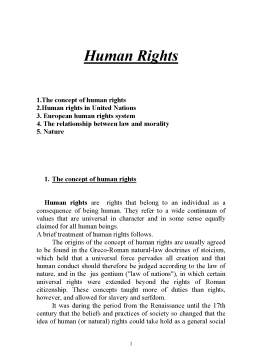Cuprins
- 1.The concept of human rights
- 2.Human rights in United Nations
- 3. European human rights system
- 4. The relationship between law and morality
- 5. Nature
Extras din proiect
1. The concept of human rights
Human rights are rights that belong to an individual as a consequence of being human. They refer to a wide continuum of values that are universal in character and in some sense equally claimed for all human beings.
A brief treatment of human rights follows.
The origins of the concept of human rights are usually agreed to be found in the Greco-Roman natural-law doctrines of stoicism, which held that a universal force pervades all creation and that human conduct should therefore be judged according to the law of nature, and in the jus gentium ("law of nations"), in which certain universal rights were extended beyond the rights of Roman citizenship. These concepts taught more of duties than rights, however, and allowed for slavery and serfdom.
It was during the period from the Renaissance until the 17th century that the beliefs and practices of society so changed that the idea of human (or natural) rights could take hold as a general social need and reality. The writings of St. Thomas Aquinas and Hugo Grotius, as well as Magna Carta, the Petition of Rights of 1628, and the English Bill of Rights, all reflected the view that human beings are endowed with certain eternal and inalienable rights.
This modernist conception of natural law as meaning natural rights was elaborated in the 17th and 18th centuries by such writers as René Descartes, Gottfried Leibniz, Benedict de Spinoza, and Francis Bacon. Particularly to be noted are the writings of the English philosopher John Locke, who was perhaps the most important natural-law theorist of modern times, and the Philosophes, including Denis Diderot, Voltaire, Montesquieu, and Jean-Jacques Rousseau.
The struggle against political absolutism in the late 18th and the 19th centuries further advanced the concept of human rights.
Thomas Jefferson and the marquis de Lafayette gave eloquence to the plain prose of the previous century, and freedoms were specified in a variety of historic documents such as The Declaration of the Rights of Man and of the Citizen (1789) and the Bill of Rights (1791) of the Constitution of the United States (1787).
The idea that natural law is the foundation for human rights came under attack during the late 18th century by such men as conservatives Edmund Burke and David Hume, as well as by Jeremy Bentham, a founder and leading proponent of utilitarianism. This assault continued into the early 20th century. Such writers as John Stuart Mill, Friedrich Karl von Savigny, Sir Henry Maine, John Austin, and Ludwig Wittgenstein sought other justifications for, and definitions of, those rights. But efforts to assert and protect the rights of humanity continued to multiply in one form or another--the abolition of slavery, labour laws, popular education, trade unionism, universal suffrage--during the 19th and early 20th centuries, and the notion of human rights had achieved universal acceptance, at least in principle, by the second half of the 20th century, following the fall of Nazi Germany.
This general agreement that all human beings are entitled to some basic rights marked the birth of the international and universal recognition of human rights. In the charter establishing the United Nations, all members were pledged to
achieve "universal respect for, and observance of, human rights and fundamental freedoms for all without distinction as to race, sex, language, or religion," and the UN has continued to affirm its commitment to human rights, particularly in such documents as the Universal Declaration of Human Rights (q.v.; 1948).
International concern for human rights has also been evident outside of the United Nations. For example, the Conference on Security and Cooperation in Europe, which met in Helsinki in 1973-75, produced the Helsinki Final Act. The European Convention for the Protection of Human Rights and Fundamental Freedoms, which first met in 1950, eventually produced the International Covenant on Civil and Political Rights and the European Social Charter; the Ninth Pan-American Conference of 1948 adopted the American Declaration on the Rights and Duties of Man; and the Organization of African Unity in 1981 adopted the African Charter on Human and Peoples' Rights.
There are also a number of private groups involved in human-rights advocacy. One of the best-known international human-rights agencies is Amnesty International (q.v.; founded in 1961), an organization dedicated to publicizing violations of human rights, especially freedoms of speech and religion and the right of political dissent.
Preview document
Conținut arhivă zip
- Human Rights.doc


























